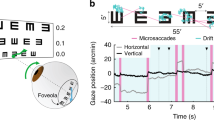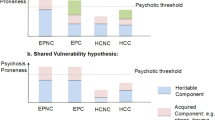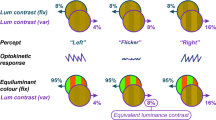Abstract
IT has been demonstrated1 that barbiturates influence conjugate eye movements selectively in that they abolish the smooth tracking movements while leaving the saccadic movements intact. Disjunctive eye movements have time characteristics akin to the tracking movements ; some effect of barbiturates on convergence has been mentioned2.
This is a preview of subscription content, access via your institution
Access options
Subscribe to this journal
Receive 51 print issues and online access
$199.00 per year
only $3.90 per issue
Buy this article
- Purchase on Springer Link
- Instant access to full article PDF
Prices may be subject to local taxes which are calculated during checkout
Similar content being viewed by others
References
Rashbass, C., Nature, 183, 897 (1959).
Bergman, P. S., Nathanson, M., and Bender, M. B., Arch. Neurol. Psychiat., 67, 357 (1952).
Adler, F. H., Physiology of the Eye, third ed., 442 (The C. V. Mosby Co., St. Louis, 1959).
Rashbass, C., and Westheimer, G., J. Physiol. (in the press).
Author information
Authors and Affiliations
Rights and permissions
About this article
Cite this article
WESTHEIMER, G., RASHBASS, C. Barbiturates and Eye Vergence. Nature 191, 833–834 (1961). https://doi.org/10.1038/191833a0
Issue Date:
DOI: https://doi.org/10.1038/191833a0
This article is cited by
-
Functional changes in the oculomotor system of the monkey at various stages of barbiturate anesthesia and alertness
Pfl�gers Archiv European Journal of Physiology (1976)
-
Vergence eye movements
Documenta Ophthalmologica (1974)
Comments
By submitting a comment you agree to abide by our Terms and Community Guidelines. If you find something abusive or that does not comply with our terms or guidelines please flag it as inappropriate.



